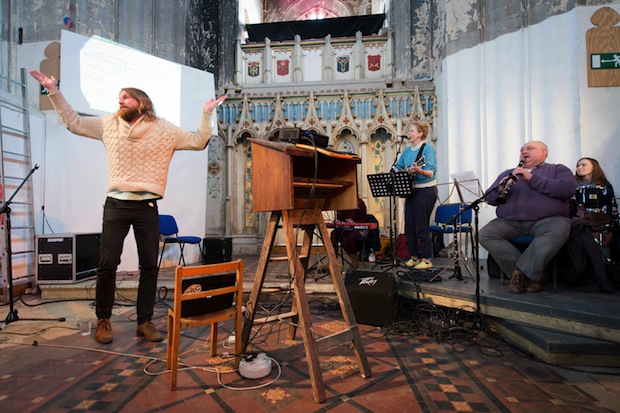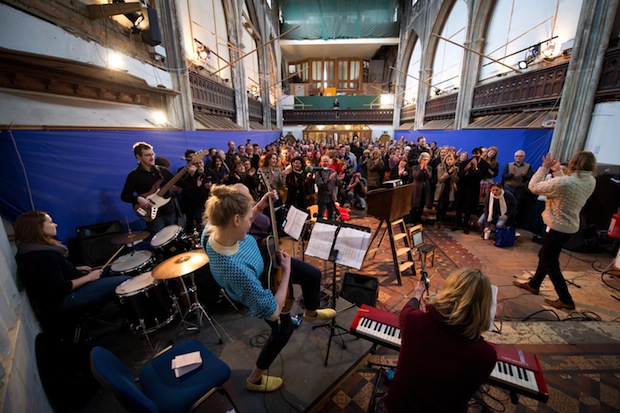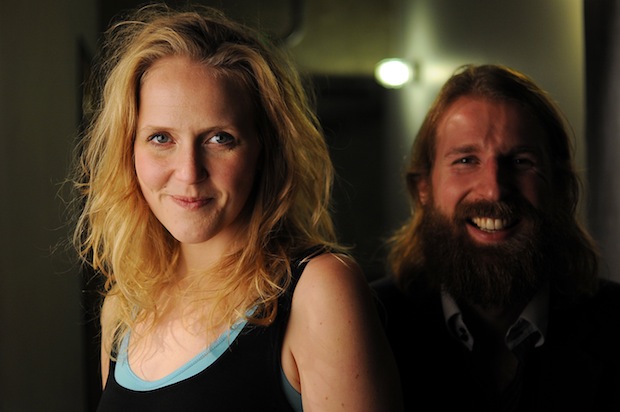I had always assumed that the one thing atheism had going for it was that you could have a lie-in on Sundays. For the past year, however, an atheist church has been meeting in London on Sunday mornings. Founded by two comedians, Sanderson Jones and Pippa Evans, the Sunday Assembly is a symptom of what Theo Hobson identified in this magazine as ‘the new new atheism’, the recognition that the new atheism of Professor Dawkins et al had, in rejecting God, gone too far in rejecting all His works. Churches, the founders felt, had much to recommend themselves — a space for inspiration, reflection, and a sense of community in an atomised city — and they found a willing audience. The Sunday Assembly now has branches in 28 cities across the English-speaking world, with more on their way.
But the sign that the atheist church had definitively come of age was its first schism. Three former members of the New York franchise broke away and formed a group called ‘Godless Revival’, complaining about the institutionalisation of what they had assumed would be nothing more than a parody church. The prophet of Godless Revival, Lee Moore, argued that Jones and Evans ‘are trying to get rich from their new-age religion… after all, we saw how well that worked for L. Ron Hubbard.’ (This is unfair — the accounts of Sunday Assembly are more open than Scientology’s, and show that Jones and Evans are only taking 12 per cent of their £500,000 fundraising target as salary — and besides, there is authority for the view that the labourer is worthy of his hire.) Moreover, Moore claimed, ‘The Sunday Assembly has a problem with atheism.’

The Sunday Assembly denies any backsliding or apostasy, and argues that, by not focusing on ‘the atheist community’, it is merely trying to be as inclusive as possible. Moore calls this ‘milquetoast atheism’, but it’s not: the two denominations have different definitions of atheism. For the Sunday Assembly, an atheist church is one that has no belief in God; the schismatics think it should be one with a belief in no God. This confessional difference is not insignificant — it’s as immense as the difference between the phrases ‘He was unmarried’ and ‘He was a confirmed bachelor’ in a Telegraph obituary — but it goes unspoken: the new new atheists are no fonder of nice philosophical distinctions, especially not that one, than the new atheists. So now the Sunday Assembly has the institutions and structure of a religion, and the Godless Revival the proselytising faith. An illustration: the Sunday Assembly has in the past invited a vicar to speak; the Godless Revival’s Facebook page has an article about the Pope’s desire to reach out to others for world peace — ‘Pope to Atheists: We need your help’ — accompanied by the comment: ‘Atheists to Pope: Go fuck yourself.’
The Sunday Assembly meets in Conway Hall, an art deco building in Holborn dedicated to free-thinking that has hosted many ‘alternative’ organisations over the past 90 years, from the British Humanist Society to the National Front. When I arrive for the latest meeting, on the theme of ‘brains’, there is a stall in the foyer selling pamphlets with serious titles and drab covers, as well as magnetic finger puppets of ‘Great Thinkers of the World’ — Einstein; Freud; Frida Kahlo; Sherlock Holmes. There is R&B music playing at exactly the right volume, and an air of excitement among the 500 or so congregants. They are mostly young, white and hip — there is a lot of facial hair among the men, and everyone seems to be wearing quirky spectacles and vintage. If the Church of England is the Conservative party at prayer, this is theguardian.com at well-not-prayer-exactly-let’s-call-it-meditation-shall-we?
The service starts with the Pointer Sisters’ ‘I’m So Excited’ projected on to the back wall. At the prompting of Sanderson Jones, the charismatic leader, everyone stands up and sings along to the small band on stage. Most clap their hands; many are swaying, holding their hands in the air — and, during the instrumental section, where the lyrics are replaced with the words ‘Jumping Break’, some do start jumping. After everyone has applauded themselves, we segue into the next song: Daft Punk’s ‘(I’m Up All Night To) Get Lucky’. On first hearing the lyrics of this song, you might assume that it was about someone searching for a missing dog — and who, amongst the dogless, doesn’t have a dog-shaped hole in their life? — but it’s actually about a man hanging around until a woman is drunk enough for, or otherwise disposed towards, sexual relations. The lyrics have been altered, though: the charismatic leader jumps up and points out that ‘If you change the “I” and “she” to “we”, the song is a lot less creepy.’
Sanderson jumps up a lot throughout the service. He looks like Jesus in quirky spectacles, but acts like Tigger: bouncy and incredibly enthusiastic about everything. He is impossible to dislike.
He introduces, first, a reading. Not having any sacred texts, the Sunday Assembly can make use of wisdom from any work of world literature, and today’s reading is taken from the American science fiction writer Terry Bisson, the author of Star Wars: Boba Fett: The Fight to Survive and the novelisation of The Fifth Element. It’s a short story, a dialogue between two sentient but incorporeal entities (aliens, presumably, rather than angels), who are horrified to discover the human brain is made of meat.
Then there is a secular homily: a neuroscientist talks for ten minutes about the brain, and how we understand it so much better than they did in the olden days. During his talk, I notice an elderly woman — there are a few in the congregation — who has arrived late and is forced to stand. A young man, who is seated, taps her on the shoulder; she turns round, expecting to be offered his seat. Instead, he motions for her to move out of the way so that he can see the neuroscientist’s PowerPoint slide.
Another song — Elvis’s ‘Always On My Mind’ — and then a few minutes’ silence for meditation. There is a collection. A young woman testifies to her life story — she is recovering from a neurological illness, and documenting her recovery on her iPhone — and receives a warm round of applause. A man stands up and talks about a new venture called Casserole Club, a sort of Meals on Wheels for the digital age, a website (www.casseroleclub.com) to help people share extra portions of home-cooked food with neighbours unable to cook for themselves. The charismatic leader finishes with an ethical meditation on self-improvement, and we sing an Aretha Franklin song.

The shape of the liturgy, therefore, is analogous to a low-church service or school assembly in most respects. It was only afterwards that I realised what was missing that you would find in any church service: there is no secular analogue to confession. You wouldn’t, of course, expect a godless congregation to find the burden of sin intolerable, or the remembrance of it to be grievous, but you might like some acknowledgement that we have done those things which we ought not to have done, and left undone some things which we ought to have done — in short, a recognition that we are anything less than super.
There was a hint of human frailty in the neurologist’s lecture: he spoke of how the brain had, being the product of evolution rather than design, certain quirks; but he added that, just so long as you were aware of these quirks — as the driver of a vintage car is aware of mechanical failings and blind spots — you can overcome them, and avoid ‘accidents’ like superstition and prejudice. But he did not suggest that anyone in the congregation was anything but a Stirling Moss of the brain.
There is no creed, of course, but when, during the collection, we are asked to talk to our neighbour, I am immediately asked by the person sitting next to me about my faith journey. I prevaricate while I search my pockets for the £5 that the charismatic leader has suggested as a donation — I feel uncomfortable admitting my theism. I have never been asked about my faith, or lack of it, in a church service. (I’ve been asked in a synagogue why I was there; but I suspect that this was less out of exclusivism than because I was noticeably taller, blonder and quieter than the rest of the congregation.) But then, I don’t go to the evangelical churches that the Sunday Assembly has self–consciously modelled itself on and reacted against. (Pippa Evans, the founder who wasn’t there on Sunday, was a worshipper at Holy Trinity Brompton until she had Doubts.)
I ring up a college chaplain I know and ask how she would react if she discovered someone who came to her services didn’t believe in God. ‘Absolutely none of my business,’ she replies, before excusing herself. To counsel, as she does every day, another undergraduate who, despite his brains, feels alone and unloved because he knows he is less than super.
Got something to add? Join the discussion and comment below.
Get 10 issues for just $10
Subscribe to The Spectator Australia today for the next 10 magazine issues, plus full online access, for just $10.
You might disagree with half of it, but you’ll enjoy reading all of it. Try your first month for free, then just $2 a week for the remainder of your first year.














Comments
Don't miss out
Join the conversation with other Spectator Australia readers. Subscribe to leave a comment.
SUBSCRIBEAlready a subscriber? Log in